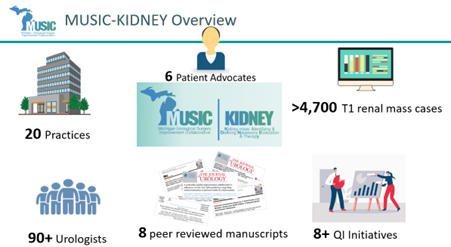Programs
KIDNEY
MUSIC KIDNEY’s mission is to make Michigan the best place in the world for renal mass care.

What is MUSIC KIDNEY?
MUSIC-KIDNEY (Kidney mass: Identifying and Defining Necessary Evaluation and therapy) is a quality improvement initiative focused on improving care for localized renal mass patients throughout the state of Michigan.
The kidneys are vital organs of the body and are about the size of a fist. They are important in removing water, salt, and waste, regulating blood pressure, and stimulating the production
of red blood cells. Masses (or growths, lesions, tumors) that form on the kidneys can be cancer or not cancer (benign). Benign tumors will not spread to other parts of the body, while cancerous tumors can do this.
For masses found to be cancer, there are several features that determine the amount of risk that is present.
The type of treatment recommended to each patient is based on the kidney mass size and stage and the patient’s overall health and condition. Options include:
- Surgery – to remove the mass along with a part or all the kidney
- Surveillance – to closely monitor the kidney mass without treatment unless the risk of the cancer increases
- Ablation or radiation therapy – to treat the cancer cells without removing any part of the kidney
The choice of treatment for a kidney mass depends on factors related to the size and stage of the tumor, as well as your preferences related to the benefits and side effects of treatment.
Talk to your doctor and your loved ones as you consider what treatment option is best for you.
What is MUSIC KIDNEY working toward?
Our primary objectives are to reduce rates of immediate intervention in patients who would benefit from surveillance and avoid treatment for benign disease.
Current Focus:
-
- Avoid treatment for benign kidney masses
- Improve kidney biopsy utilization among those with newly diagnosed kidney masses
- Improve the quality of imaging for kidney masses in Michigan
- Enhance treatment appropriateness for patients with localized kidney masses
- Improve short term recovery and functional outcomes for patients undergoing kidney mass surgery
- Enhance the technical quality of partial nephrectomy
- Safely limit the number of opioid tablets a patient receives following kidney mass surgery
- Avoid treatment for benign kidney masses

Improving the utilization of renal mass biopsy (RMB) to inform the choice of treatment for kidney masses
Improving peri-operative outcomes for patients undergoing partial and radical nephrectomies
Improve partial nephrectomy outcomes for patients using video-based assessment of surgical technique
